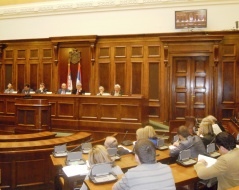National Assembly of the Republic of Serbia / Activities / Activity details

12 December 2012 Participants of the second public hearing on the Education Development Strategy in the Republic of Serbia until 2020
Wednesday, 12 December 2012
Second Public Hearing Held on Education Development Strategy in the Republic of Serbia until 2020
Today, the Committee on Education, Science, Technological Development and the Information Society organised the second public hearing on the Education Development Strategy in the Republic of Serbia until 2020, at the National Assembly House.
In the opening address, the Chairman of the Committee on Education, Science, Technological Development and the Information Society, Prof. Dr Miodrag Stojkovic said that the topics of the public hearing were pre-university and university education.
Greeting the participants, the Minister of Education, Science and Technological Development, Prof. Dr Zarko Obradovic, said that the Strategy covers the entire Serbian education system, from nursery-school to university, and aimed to boost the number of educated people and improve the quality of education. He said that the key idea in the preparation of the document was that the social development and wellbeing in the upcoming period required an educated nation, not an educated elite.
Obradovic said that it was difficult to harmonise education and the economy in countries in transition and countries which had invested in their education were now highly developed, even though they were not before.
The introductory speakers, Prof. Dr Ivan Ivic and Prof. Dr Ana Pesikan, pointed out that the demographic decrease was one of the key problems Serbia faced, and the trend of dropping birth rates continued. They illustrated the claim by stating that 110 000 children were born in Serbia in 1980, while that number last year was a mere 65 000, which would, they deemed, lead to a deficit in human potential.
Prof. Dr Vlastimir Matejic, Prof. Dr Dragan Domazet, Prof. Dr Vera Dondur and Prof. Dr Ratko Jankov also had opening addresses on the topic of higher education, stressing that higher education institutions in Serbia can contribute to the creation of an educational service industry by educating foreign students, attracting foreign investors who would employ highly qualified staff, etc. They said that out 140 observed countries, the Serbian university is the 55th by the quality of the education it provides, but the drain of highly qualified individuals who can not find employment in Serbia remains a big problem for the state.
The Committee members stressed that the Education Strategy contains a list of measures the state intends to implement to raise the quality of education, as well as education in rural areas. They emphasised the need for higher investment into education, which should not be viewed merely as public spending, as well as better organisation and technological innovation of the education process.
In the debate, the participants exchanged opinions on what should be done to ensure that the education contributes more to the economic and overall development of society, then on the efficiency of the education, the role of teachers and parents in the education process.




